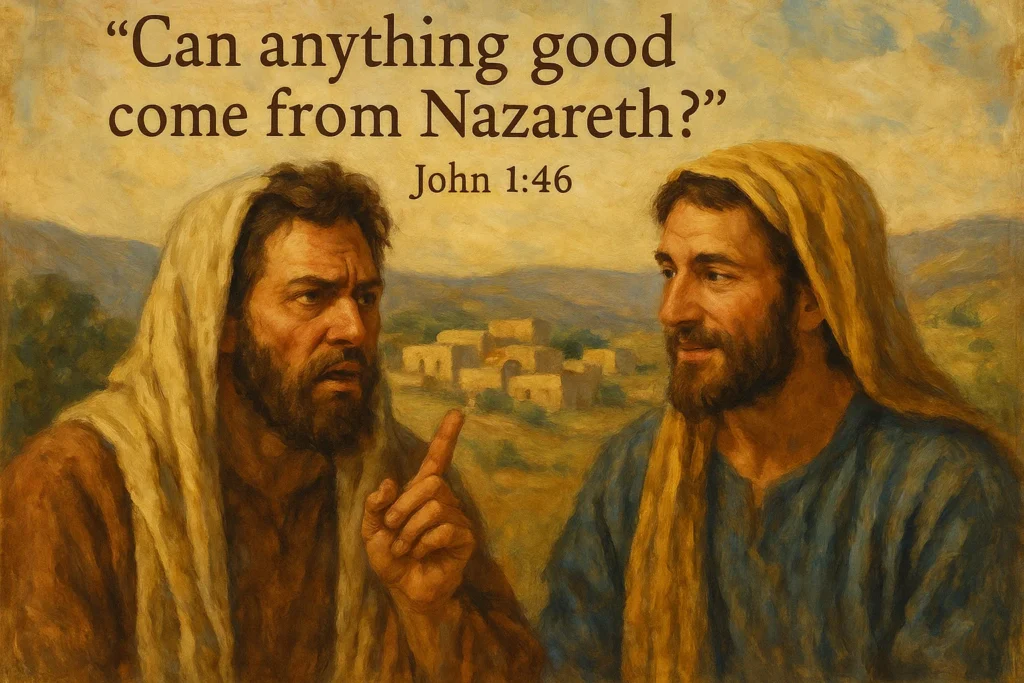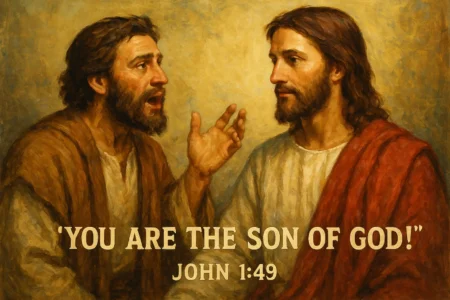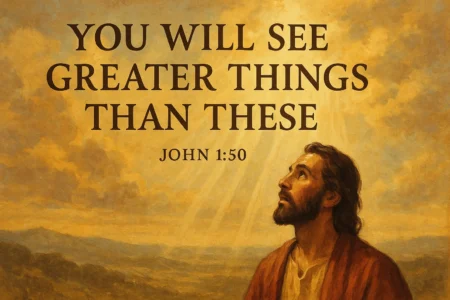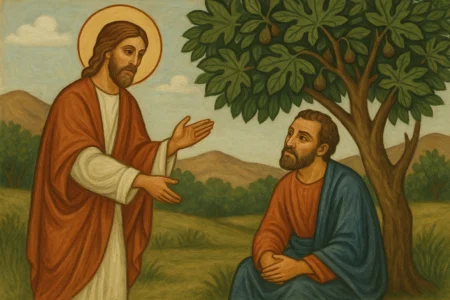It’s one of the most honest, cynical, and flat-out relatable moments in the entire Bible.
It’s a quick jab. A dismissive retort. A full-blown expression of regional prejudice, all wrapped up in a single, sarcastic question.
Here’s the scene. Philip, energized and breathless with the news of a lifetime, finds his friend Nathanael. He’s practically vibrating with excitement. He blurts out, “We have found him of whom Moses in the Law and also the prophets wrote, Jesus of Nazareth, the son of Joseph.”
He’s just announced the fulfillment of all of history. The moment they’ve been waiting for. The Messiah.
Nathanael’s response is… well, it’s blunt.
He doesn’t ask about this man’s teaching. He doesn’t inquire about His miracles. He doesn’t even question the claim that he’s the Messiah. He just scoffs at the address.
“Nazareth? Can anything good come from Nazareth?”
It’s a question that just hangs in the air, dripping with sarcasm. But this single line, recorded in John 1:46, cracks open a profound conversation. It challenges our deepest assumptions about value, about origin, and about the very nature of God.
We read it, and we might chuckle. We might judge Nathanael. Or, if we’re really honest with ourselves, we might just see a bit of ourselves in him.
This article is a deep dive into the John 1:46 meaning. We’re moving beyond a simple Bible verse to understand the dirt-under-the-fingernails history, the raw human prejudice, and the beautiful, life-changing response that echoes to this day.
More in John Chapter 1 Category
Key Takeaways
- The “John 1:46 Meaning” Is Rooted in Prejudice: Nathanael’s question wasn’t a philosophical query. It was a sneer. It reveals a strong, ingrained regional bias. Nazareth was a small, obscure, and utterly insignificant village, completely overshadowed by the nearby Roman metropolis of Sepphoris and unmentioned in the Old Testament or other major Jewish texts.
- Nazareth Was a “Nowhere” Town: Historically, Nazareth was a tiny hamlet of perhaps a few hundred people. It had no political power. No economic influence. No religious significance. To say the Messiah came from Nazareth was, to anyone “in the know,” a laughable contradiction.
- Philip’s Response Is a Model: Philip doesn’t argue. He doesn’t debate theology. He doesn’t defend Nazareth’s reputation. He offers a simple, powerful, three-word invitation that cuts through all the prejudice: “Come and see.” This masterfully shifts the focus from an intellectual argument to a personal encounter.
- God Intentionally Chooses the Obscure: This story powerfully illustrates a central theme of the Bible. God consistently chooses the humble, the overlooked, and the “foolish” things of the world (like a manger in Bethlehem, a cross on Calvary, or a carpenter from Nazareth) to display His power and wisdom.
- The Question Is Still Relevant: We all have our own “Nazareths.” These are the places, people, or ideas we dismiss out of hand. The challenge of John 1:46 is to identify our own biases and accept the invitation to “come and see” for ourselves before we pass judgment.
What Was Really Going On with Nathanael?
To get the full impact of the verse, you have to understand the man who said it. Nathanael wasn’t just some random guy on the street corner. The fact that Philip sprinted to find him immediately suggests he was a close friend, someone who shared his deep spiritual hunger.
He was a man who knew his stuff. This wasn’t a casual skeptic; this was an educated one.
Who Was This Man Under the Fig Tree?
When Jesus finally meets Nathanael, He pays him an incredible, flooring compliment: “Behold, an Israelite indeed, in whom there is no deceit!” (John 1:47).
This wasn’t small talk. Jesus was saying, “Here is a man of total integrity. He is sincere. He is authentic. He is without guile.” He’s the real deal.
Nathanael was a devout Jew. He was a student of the Torah. The “fig tree” Jesus mentions seeing him under? That was a well-known place for rabbis and their disciples to sit, study, and meditate on the Scriptures. It was an outdoor study, a place of peace and profound thought. This tells us Nathanael wasn’t a casual believer. He was an expert. He was waiting. He was longing for the Messiah.
He had a very clear, very educated picture of what the Messiah would be, where He would come from, and how He would act.
And “from Nazareth” wasn’t part of that picture.
Why Would He Say Something So Insulting?
Nathanael’s reaction wasn’t just casual snobbery. It was a form of theological whiplash.
He had expectations. He knew the prophecies. The prophet Micah had said the ruler would come from Bethlehem (Micah 5:2). Isaiah and Zechariah had painted pictures of a powerful, glorious king who would restore Israel. He was looking for a lion, someone to free Israel from its Roman oppressors.
Nobody’s prophecies mentioned Nazareth.
This obscure village wasn’t just a neutral location. It was a non-entity. To Nathanael, saying “the Messiah is from Nazareth” was like a modern physicist saying, “I’ve discovered a new law of gravity, and my source is a comic book.” It just didn’t compute. It was a contradiction in terms.
His question, “Can anything good come from Nazareth?” was his educated, if cynical, way of saying, “That’s impossible. You’ve got the wrong guy. Check your sources, Philip.”
His prejudice wasn’t born from ignorance. It was born from his knowledge. He thought he knew better.
So, Was Nazareth Really That Bad?
Nathanael’s skepticism wasn’t entirely baseless, at least from a worldly point of view. When we think of Jesus’ hometown, we often project our modern, quaint “little town” ideals onto it. We picture a peaceful, charming village.
The reality was… different.
Digging into the History: Why No Respect for Nazareth?
First, Nazareth was tiny. I mean, really tiny. Estimates from archaeology suggest the population in the 1st century was probably somewhere between 200 and 500 people. This wasn’t a town; it was a hamlet. It was a handful of families scratching out a living on a rocky hillside.
Second, it was completely obscure. You can read the entire Old Testament. You won’t find Nazareth. You can read the Talmud. Not there. You can read the works of Josephus, the famous 1st-century Jewish historian who wrote exhaustively about Galilee. He meticulously lists 45 other towns in the region. He never mentions Nazareth.
It was, quite literally, not on the map.
Third, it was completely overshadowed. Just four miles away, a short walk over the hill, was the city of Sepphoris. Sepphoris was a major, Hellenized (Greek-influenced), and Romanized city. It was rebuilt by Herod Antipas during Jesus’s youth and was known as “the jewel of all Galilee.” It had a theater, a palace, colonnaded streets, and a thriving market. It was a center of commerce and culture.
Nazareth was just a poor, forgotten, Aramaic-speaking village in its shadow. People from Sepphoris probably looked down on Nazarenes as uncultured hicks.
I get this. I grew up in a very small, rural town. When I’d go to the “big city” (which was only 40,000 people) for a high school event and tell people where I was from, I’d get that look. That same, “Oh. There.” That little smirk that said, “Can anything good come from there?”
Nathanael’s jab was a low blow, but it was one that everyone in the region would have understood perfectly.
Did “Nazareth” Mean More Than Just a Place?
Because of its total insignificance, some have speculated that Nathanael’s comment was even harsher. It’s possible “Nazareth” wasn’t just unknown but had a bad reputation.
We can’t know for sure, but it’s possible. Maybe its residents were seen as rough, uneducated, or even collaborators with the nearby Romans in Sepphoris (where many of the men, possibly including Jesus and Joseph, would have had to find work as laborers or carpenters).
What we do know is that “Nazarene” became a term of contempt for Jesus and His followers. It was a slur. When the early Christians were being arrested, their accusers called them “the ringleader of the sect of the Nazarenes” (Acts 24:5). It wasn’t a neutral geographical descriptor. It was an insult, meant to link them to this despised, insignificant place.
So, when Nathanael asks his question, he’s channeling all of this. He’s saying, “The Messiah? The King of Kings? The hope of Israel? From that dump? You’re kidding me.”
Unpacking the “John 1:46 Meaning” for the First Disciples
Nathanael’s biting question, as cynical as it was, sets up one of the most brilliant and effective responses in all of Scripture. Philip’s reply is an absolute masterclass in sharing a world-changing message.
Why Did Philip Even Bother with Nathanael?
You have to put yourself in Philip’s shoes. He had just had his own “come and see” moment. Jesus of Nazareth found him and simply said, “Follow me.” (John 1:43). That was it. And Philip, for reasons the text doesn’t fully explain, did.
His excitement was so immediate, so electric, that his very first instinct was to go get his friend. His best friend. The guy he argued theology with.
He wasn’t a trained apologist. He wasn’t ready for a debate. He was just a man who had seen something—Someone—who changed his entire perspective in an instant. He wasn’t prepared for Nathanael’s cynicism. He probably expected his friend, the devout student of the Torah, to be the most excited.
When Nathanael hits him with the “Nazareth” insult, Philip doesn’t flinch. He doesn’t get defensive. He doesn’t puff up his chest and try to argue for the honor of Nazareth. He doesn’t pull out a scroll and try to find some obscure prophetic loophole.
His response is perfect.
“Come and See”: The Most Powerful Invitation?
Philip says just three words: “Come and see.”
This is the core of the John 1:46 meaning. It’s an invitation that bypasses prejudice. It’s a challenge that sidesteps intellectual arguments. Philip’s response is brilliant for so many reasons:
- It’s Personal: He doesn’t offer theories; he offers an introduction. He’s not asking Nathanael to believe a abstract fact; he’s asking him to meet a person.
- It’s Experiential: It shifts the entire debate from “what I think” to “what you can experience for yourself.” It actually respects Nathanael’s intelligence by trusting him to make up his own mind, but only after he has all the evidence.
- It’s Confident: Philip is so sure of what he’s found that he knows Jesus can handle the skepticism. He doesn’t need to defend Jesus; Jesus will reveal Himself.
- It’s Actionable: It’s not a command to “believe.” It’s an invitation to “go.” It calls for a simple, physical step of faith.
“Come and see” is the absolute antithesis of a blind leap. It’s an invitation to open your eyes. Philip essentially says, “Look, I know what you’re saying. It sounds crazy. I can’t explain it. But if you just come with me, you’ll understand.”
How Does Jesus Respond to This Skeptic?
This is where the story gets really, really good. Nathanael, despite his massive reservations and his sharp-tongued comment, actually goes.
This is the part that proves Jesus right. Nathanael is a man of integrity (“no deceit”). His integrity means he’s at least willing to check it out. He’s a skeptic, but he’s an honest skeptic. He’s not going to let his prejudice have the final word.
He walks up to Jesus, probably with his arms figuratively crossed, ready to debunk this “Messiah” from a backwater village.
But Jesus speaks first.
“An Israelite in Whom There Is No Deceit”
Before Nathanael can even get a word out, Jesus completely disarms him. “Behold, an Israelite indeed, in whom there is no deceit!”
This is a strategic, surgical strike of grace.
Jesus doesn’t say, “Hey, what’s this I hear about you dissing my hometown?” He doesn’t get defensive. He doesn’t clap back. Instead, He looks right past Nathanael’s prejudice and speaks directly to his character. He affirms the one thing Nathanael values most about himself: his sincerity.
Nathanael is stunned. He’s been seen. He blurts out, “How… how do you know me?”
He came expecting a charlatan. He’s suddenly confronted by someone who can read his mail.
The Fig Tree Moment: What Did It Signify?
Jesus’s next line is the one that changes everything. It’s the knockout punch. “Before Philip called you, when you were under the fig tree, I saw you.”
This is not a simple “I saw you sitting over there.” This was a moment of profound, supernatural knowledge.
We don’t know exactly what was happening under that fig tree. But we know it was a common place for devout study. Was Nathanael praying a specific prayer? Was he wrestling with a specific passage of Scripture, maybe one about the Messiah? Was he having a moment of deep, private longing for God to finally act?
We don’t know the specifics. But Nathanael did.
Whatever happened under that fig tree was private. It was intimate. It was a secret between him and God. And Jesus, this carpenter from Nazareth, just revealed that He was in on that secret. He had “seen” him, not with human eyes, but with divine ones. He had seen his heart.
From “Can Anything Good Come?” to “You Are the Son of God!”
In that single instant, all of Nathanael’s prejudice shatters. His theological objections, his regional snobbery, his intellectual pride—it all vanishes.
It’s gone.
He’s had his “come and see” moment, and the evidence is overwhelming. The person of Jesus just bypassed all his mental defenses and spoke directly to his soul.
His response is as immediate and profound as his earlier skepticism was cynical.
“Rabbi, you are the Son of God! You are the King of Israel!” (John 1:49)
Nathanael’s 180-degree turn is one of the most dramatic in the Bible. He goes from a total skeptic to a full-throated believer in a single sentence. The encounter proved what the argument never could. The person of Jesus was the only defense Nazareth ever needed.
Why Does God Choose “Nazareth” Anyway?
This whole episode is more than just a clever story about Jesus winning over a skeptic. It’s a living parable of God’s entire strategy. The question “Can anything good come from Nazareth?” is one that God seems to intentionally, almost gleefully, invite.
He loves to choose “Nazareth.”
The “Humble Beginnings” Theme in Scripture
This is God’s M.O. throughout the whole of history. He almost never chooses the person or place that makes the most “sense.”
Think about it.
- He doesn’t choose a powerful Egyptian prince; He chooses Moses, a fugitive shepherd with a speech impediment.
- He doesn’t choose the oldest, strongest, most handsome son of Jesse; He chooses David, the runt of the litter, a shepherd boy.
- He doesn’t choose a powerful army; He chooses Gideon and his 300 men with clay pots and torches.
- He doesn’t choose a queen; He chooses Esther, an orphan.
- He doesn’t choose a native; He chooses Ruth, a foreigner.
The apostle Paul would later write about this very strategy. He says that God “chose what is foolish in the world to shame the wise; God chose what is weak in the world to shame the strong.” (1 Corinthians 1:27).
This isn’t just a quirky habit; it’s central to His message.
If Jesus Came from Rome, Would We Believe?
Imagine for a second that Jesus had come from a place of power. What if He had been born a prince in Rome? Or the son of the High Priest in Jerusalem, born in the Temple?
If Jesus had come with worldly power, wealth, and prestige, His message would have been completely different. It would have been a message of human power, political influence, and worldly success. We would believe in Him because of His army, His wealth, or His pedigree. We would follow Him to get a piece of that power.
But God’s kingdom doesn’t work that way.
By choosing Nazareth, God makes an undeniable statement. He’s declaring that His power is not of this world. His approval isn’t based on your zip code, your family name, your education, or your social status. He intentionally chose an obscure village, a humble family, and a manual-labor trade to show that the value of a thing is not determined by its origin, but by His choice.
The goodness didn’t come from Nazareth. The goodness was brought to Nazareth. And because of that, a place of no significance became the most famous hometown in human history.
Are We All a Little Bit Like Nathanael?
It’s easy to read this story and cast Nathanael as the bad guy. It’s easy to sit back, 2,000 years later, and feel superior to his short-sighted prejudice.
But if we’re honest, we do this all the time.
We are all, in some way, Nathanaels. We all have our “Nazareths.”
Identifying Our Own “Nazareths”
I’m a huge baseball fan. I love my team. And I have to be completely, embarrassingly honest: when my team signs a player who used to play for our biggest rival, my first instinct is, “Ugh, that guy? I hate that guy.” I’ve already judged him. I’ve dismissed his talent. I’ve decided I don’t like him, all because of the jersey he used to wear. That’s my “Nazareth.”
We do this in ways that are far more significant, too. What are the “Nazareths” we carry around in our heads?
- The “wrong” political party.
- The “wrong” side of the tracks.
- The “wrong” college (or lack of one).
- The “wrong” accent.
- The “wrong” denomination.
- The “wrong” company.
- The “wrong” music, or movies, or books.
We dismiss people, ideas, and opportunities every day because they come from a “place” we’ve already decided is worthless. We see a resume from a non-prestigious school and we put it at the bottom of the pile. We hear an idea from a junior-level employee in a meeting and we don’t really listen. We meet someone from a background we don’t understand and we’re polite, but we’ve already written them off.
What Does It Mean to “Come and See” Today?
The challenge of John 1:46 isn’t to pretend we don’t have these biases. We’re human; we have them. The challenge is to recognize them. It’s to hear Philip’s voice in our heads: “Come and see.”
To “come and see” today means to suspend judgment long enough to have an encounter.
It means listening to the idea from the junior employee with the same respect you’d give the CEO. It means engaging with the person from the “wrong” political party as a human being, not a caricature. It means reading the book, visiting the place, or having the conversation before we form our opinion.
It means being an honest skeptic, just like Nathanael. He was wrong. He was prejudiced. But he was willing to be proven wrong.
He was willing to show up.
The deep, lasting John 1:46 meaning is a journey, and it’s our journey. It’s the journey from snap-judgment prejudice to personal encounter. It’s the journey from “I know” to “I’m willing to see.”
Nathanael’s cynical question, “Can anything good come from Nazareth?” was answered. Not with a “yes.” Not with a debate.
It was answered with a person.
The question still echoes today, in a thousand different forms, from a thousand different people. But Philip’s response also echoes: “Come and see.”
It’s an invitation that still has the power to change our minds, our hearts, and our world. The only question is, are we, like Nathanael, willing to go?
FAQ – John 1:46 Meaning
Why did Philip respond with ‘Come and see’ instead of defending Nazareth or arguing the point?
Philip’s response, ‘Come and see,’ was a powerful, personal invitation that sidestepped prejudice and debate, encouraging an experiential encounter with Jesus, trusting that Jesus’s character would speak for itself.
What does Jesus’s knowledge of Nathanael under the fig tree tell us about Him?
Jesus’s mention of Nathanael’s time under the fig tree reveals His supernatural insight into Nathanael’s private thoughts or prayers, affirming His divine nature and His ability to see into the heart of individuals.
How does the story of Jesus from Nazareth illustrate God’s choice of humble beginnings?
The story exemplifies that God often chooses what is small, overlooked, and humble—like Nazareth—to demonstrate that His power and purpose are not based on worldly status or prestige, but on His divine calling and intention.
What is the modern application of the invitation ‘Come and see’ from John 1:46?
The modern application is to suspend our biases, approach others and new ideas with openness, and seek personal encounters before passing judgment, embodying the spirit of curiosity and honesty exemplified by Philip.





